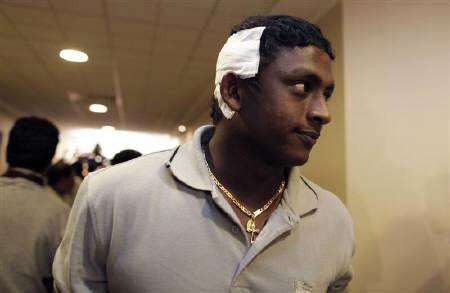8 years ago today: Attack on the Sri Lankan cricket team
Early morning on March 3, 2009 a bus carrying the Sri Lankan cricket team to Lahore's Qaddafi Stadium for Day Three of their second Test match against Pakistan was targetted by militants.
Pakistan's millions of cricket fans rue the deplorable attack, especially since it deprived an entire generation of experiencing first-hand what is arguably the most celebrated game in the country.
As the Pakistan Super League final approaches, the memory of March 3, 2009 has motivated unprecedented levels of security and safety for both the stars of the game as well as those who will turn up to support them.
The following is an account of what transpired on that fateful day.
Around 8:50am, terrorists stormed through Liberty Chowk, Lahore, with the intention of carrying out a multi-pronged attack on the Sri Lankan team's convoy.
Using RPGs, hand grenades and guns, the attackers took aim at the bus carrying the cricketers.
"For some reason I moved my head to get a better view and a split second later I felt a bullet fizz past my ear into the vacant seat," Mahela Jayawardene told ESPNCricinfo after the attack.

The Pakistani driver of the team's bus was shot, but in a remarkable feat of endurance and extraordinary presence of mind, he managed to drive the team away from the assault to safety.
Tragically, seven people were killed — including six policemen — and another 20 injured in the attack. The injured included seven members of the visiting cricket team.

Before leaving Pakistan, Mahela Jayawardene thanked the bus driver for saving the team.

"We owe the team bus driver our lives for his remarkable bravery in the face of direct gunfire ... Had he not had the courage and presence of mind to get the bus moving after the initial attack then we'd have been a far easier target for the terrorists,” the cricketing star said, recalling the horror.
"I honestly don't know how we escaped."

Following the attack, questions were raised about the quality of security afforded to the visiting cricket team.
The capital city police officer at the time, Haji Habibur Rehman, claimed the Punjab government had been informed by intelligence officials in January 2009 of a possible assault on the visiting cricket team by the Indian spy agency, Research and Analysis Wing.
But Punjab's then police chief, Khawaja Khalid Farooq denied this claim and Punjab police and home department officials insisted they had taken every step to protect the guests.
As authorities work to bring international cricket back to Pakistan, there is a recognition that extraordinary measures need to be taken to ensure players’ safety.
Soon after the Punjab government, the Pakistan Cricket Board and the Pakistan Super League (PSL) management agreed to hold the league’s grand finale in Lahore, authorities announced they would take ‘unprecedented’ security measures for all foreign players who will be travelling to Pakistan to play.
Among the measures announced is a presidential-level ‘five-tier’ security plan and ‘box security’ with guards dedicated to each individual's protection.
Explore: Five-tier security planned for PSL final participants
Amid a nationwide crackdown on ‘mischievous elements’, Pakistan Army has also assured its full support for the sporting event, and law enforcement agencies are taking all measures necessary to ensure that there is no security breach on the day of the match.

Timeline of terror
Pakistan is not the only country where the uncertain security situation has sparked concerns for visiting cricket teams.
Unfortunately, Sri Lanka has also experienced multiple terrorist incidents during international cricket series.
Colombo: April 21, 1987
A car bomb at a bus station killed over 100 people during New Zealand's three-Test tour of the country. The series was cut short to just one Test.
Colombo: Nov 16, 1992
A Tamil Tiger suicide attack outside the hotel where the New Zealand cricket team is staying kills four people. Five players and the team's coach return home on compassionate grounds after the incident.
Colombo: Feb 11, 1996
A week after a bomb blast in Colombo kills 80 people and injures 1,200 others, Australia and West Indies refuse to play preliminary World Cup matches in Sri Lanka.
Colombo: July 24, 2001
A Tamil Tigers suicide attack closes Colombo's international airport as the New Zealand cricket team is on tour. At least 14 people are killed and 12 others wounded in an attack. The visitors play a match the next day amid heightened security.
Karachi: May 2002
New Zealand aborts a tour to Pakistan after a bomb explodes outside the team`s hotel in Karachi, killing at least 11 French engineers.
Aug 2002
Australia cancels a tour to Pakistan over security concerns in the wake of the 9/11 attacks. The series is shifted to in the United Arab Emirates.
Karachi, Sept 2003
A bomb blast in Karachi forces the South African team to postpone its tour by a week.
New Delhi, Sept 13, 2008
Five blasts in the crowded markets and streets of Delhi killed 20 people and injured more than 90 just a week before the Austrlian cricket team was due to arrive for a tour. The team goes ahead with the tour.
Mumbai, Nov 26, 2008
Gunmen tear through Mumbai hitting high-profile targets and killing about 170 people. The England cricket team flies home from India.
Lahore, March 2009
Gunmen with rifles, grenades and rocket launchers attack Sri Lanka`s team in Lahore on its way to play the third day of the second test. Seven players, an umpire and an assistant coach are wounded, and six policemen and a driver are killed.
Lahore, May 30, 2015
A suicide blast outside Lahore's Qadhafi Stadium kills one person as the Zimbabwe team plays against Pakistan in the first One-Day International featuring an international team since the 2009 attack.






